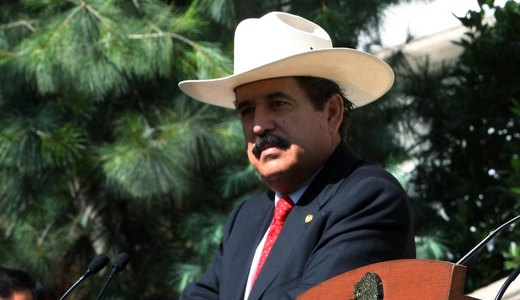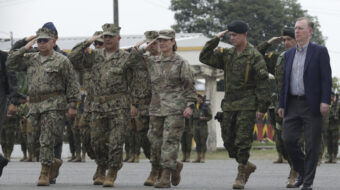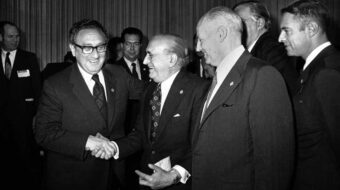
Former President Juan Manuel Zelaya, who was removed by a June 2009 military coup, returned May 28 to Honduras from exile in the Dominican Republic.
On his flight from Managua, Nicaragua, were the Venezuelan and Dominican foreign ministers, ex- Panamanian President Martín Torrijos, Colombian peace activist Piedad Cordoba and Father Roy Bourgeois and Lisa Sullivan of the U.S. based School of the Americas Watch. Hundreds of thousands of supporters had been waiting nearby for eight hours. Police and soldiers were notably absent. Slogans and red shirts of the National Front for Popular Resistance (FNRP), which Zelaya heads, proliferated. Addressing the crowd, Zelaya urged “peaceful resistance.”
“Our cry is for return of all rights and guarantees of Honduran democracy,” he told supporters. “We are heading for a constituent assembly to win back power.”
Former first lady Xiomara Castro de Zelaya read the “agreement of reconciliation” signed by Zelaya and current Honduran President Porfirio Lobo a week earlier. Afterwards, at the government palace, President Lobo received Zelaya, his family, representatives of eight Latin American nations, and José Miguel Insulza, secretary general of the Organization of American States (OAS).
At a meeting in Cartagena, Colombia, on April 9, Presidents Hugo Chavez of Venezuela and Juan Manual Santos of Colombia had conferred with President Lobo and, by telephone, with ex-President Zelaya. Plans were laid for Zelaya and 200 other exiles to return to Honduras in exchange for the OAS restoring the nation to full membership. Speaking to reporters, Chavez called for “peace and democracy in Honduras” and “a great zone of peace” in Latin America. A week later, Zelaya and other FNRP leaders met with Chavez in Caracas. In a press conference, four key FNRP demands, which would become the basis for an agreement signed in Cartagena on May 22, were articulated.
The first point guarantees the return to Honduras for Zelaya and former political colleagues, along with recognition of their legal rights, including political participation. Secondly, constitutional norms regarding human rights would be respected. Thirdly, the FNRP would apply to “the Supreme Electoral Tribunal for authorization to participate in electoral political processes.” Fourthly, the government, constitutionally authorized to arrange for plebiscites and referenda, would be prepared to make good on “the desire shown by ex-President Zelaya to convoke a National Constituent Assembly.”
In Cartagena, Lobo and Zelaya signed a document under which Honduras would rejoin multilateral organizations, specifically the OAS, which had expelled Honduras after the coup. In exchange, Honduras would solve its political crisis by implementing the four demands.
In response, the FNRP complained of gaps in dealing with human rights abuses. Political Committee member Esly Banegas pointed out that, “Persecution, repression, murders, total impunity continue.” There is the additional difficulty of the FNRP National Assembly in February having decided to shun elections until a new election law was in place and a Constituent Assembly convoked.
Analyst Ollantay Itzamna, attempting to explain the turnabout of a right wing, oppressive Honduran government, cited severe economic distress affecting the government and Honduran society. International aid closed down after the coup. The United States, alleging regime corruption, cut $200 million in aid for 2011. Now, OAS reincorporation portends access to $600 million in aid funds. And, Itzamna says, the Honduran elite was responding to a new balance of forces in following the lead of regional leaders rather than that of Washington.
On May 24, the OAS Permanent Council set today as the date for a special OAS meeting to decide on the re-admission for Honduras. A two-thirds vote is required. President Rafael Correa of Ecuador opposes readmission, as do members of the FNRP leadership.
Meanwhile, the FNRP and its returned coordinator are at work. The day after his return, Zelaya met with five teachers on a hunger strike. They were protesting being fired for demonstrating against school privatization. The FNRP has begun a petition campaign to induce the Supreme Election Tribunal to recognize the FNRP as a political party. The point, according to FNRP sub-coordinator Juan Barahona, is “the resistance taking power.” That means, Zelaya told a TeleSur interviewer, “The constitution of a broad front … and for that we have to make alliances [so that] this force can have a people’s power triumph in the next elections.”
Photo: The Honduran president befor his ouster. Gobierno Federal // CC 2.0












Comments